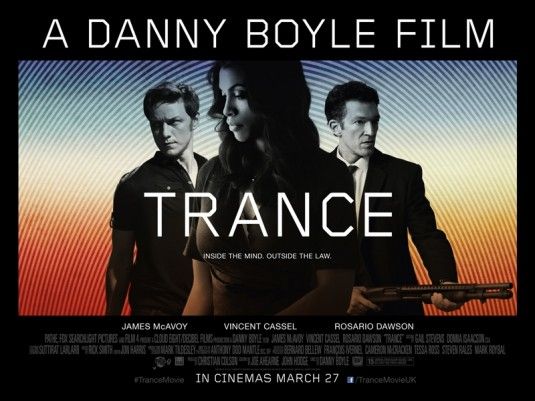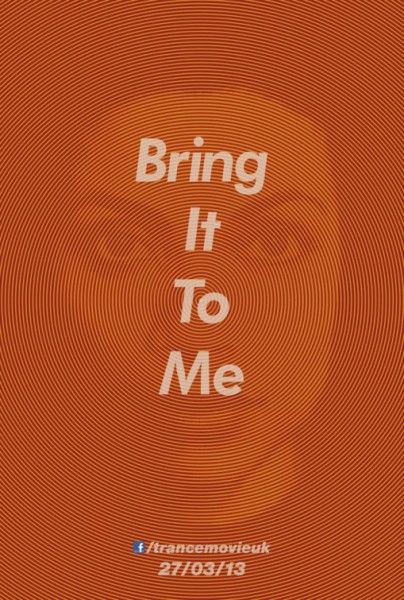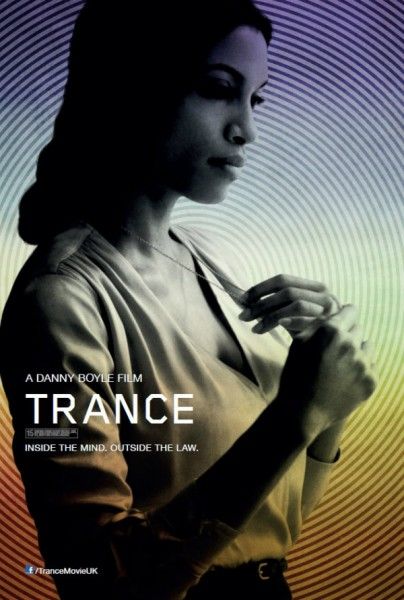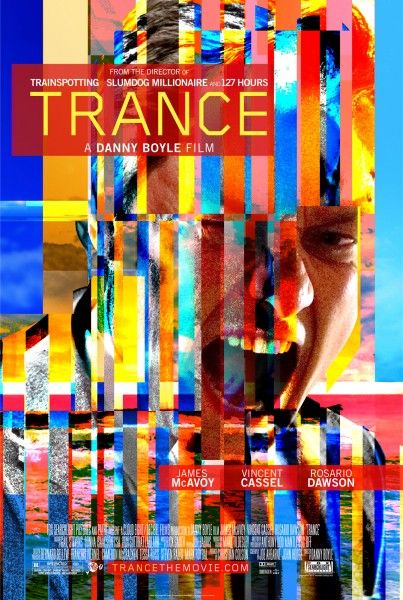Rosario Dawson takes on one of the biggest acting challenges of her career playing an alluring hypnotherapist hired to help recover an amnesiac thief’s (James McAvoy) lost memories in Academy Award winning director Danny Boyle’s crime thriller, Trance, opening in theaters on April 5th. When an adeptly planned heist at an auction house goes violently awry, the story quickly turns into a high stakes triangle where the painting’s thief, his partner in crime (Vincent Cassel), and the hypnotist all become trapped together in a mind bending puzzle of their own making.
At a roundtable interview at the film’s recent press day, Dawson talked about working with Boyle and helping to bring his vision to life. She discussed preparing for the pivotal role, taking audiences on a fascinating journey into the world of the subconscious, finding a way to play a very complex character without giving away too much to the audience, holding her own as the female at the center of a male-dominated story, and her nude scene with McAvoy that is one of the movie’s most powerful moments. Hit the jump to read more.
Question: Have you ever undergone hypnosis?
Rosario Dawson: We had someone who came in to see us in London to try to put us under. We all very much wanted to go under, but we were also incredibly distracted trying to see if anyone else had gone under. James had a moment where he couldn’t pry his fingers apart. Vincent doesn’t believe it at all and thinks he was just messing with us. But James has talked about it since in press, and he is very serious, so I take him seriously if he said he really couldn’t do it which I thought was amazing. I had also met with someone here. It’s not so much when you’re not trying to do a trick, where you’re trying to get someone to raise their arm or not do anything strange, but you automatically do because someone goes, “Okay, now raise your left arm.” So, you’re doing it. It’s not because it’s involuntary or weird, but you’re going, “Okay, I’m waiting to see if something’s happening, so I’m going to listen to everything you tell me to do.” It’s interesting. Now, if I get stuck and suddenly can’t do it, I haven’t experienced that, but I definitely felt that feeling of in between sleep and awake, where your body lulls and gets cold because it starts to shut down and go, “Okay, you’re resting.” So, she throws a blanket over you, and you get very calm and you’re just hearing. It was important for me to see those types of physiological changes and also see how important it is for the voice to be very warm but also throwaway and relaxed. It’s not speech. It’s not monologues. It’s a very different type of cadence, so that kind of stuff was really helpful to me, but I didn’t actually go under.
Had you ever gone under prior to this?
Dawson: No. But I had heard about so many different people that I knew who had quit smoking for a year because of it. And then, they say that after about a year you should go back in and do it again. My friends who did stayed off cigarettes. And then, my friends who didn’t, they’d get back on. But during that year, they were annoying. Suddenly it was like, “You used to be a chain smoker and now someone lights a cigarette a block away and you’re like ‘Ohhh! I’m trying to breathe over here.’” It was amazing to see those kinds of transformations in people and it’s psychological. It’s what you’re telling yourself, what you want more.
Your acting goes through quite a transformation. Initially, we know so little about your character, and then, in the end, you reveal a lot. Is it hard to play a character like that?
Dawson: No, actually a lot of those things were accidental. I had worn a little hair piece at the very front to give me a widow’s peak, because I don’t have one and I’d always wanted one. My poor hair and make-up woman had all the drama of a wig lace without the actual wig. It did something really interesting. It changed my face a bit, and then we were experimenting with it. Suddenly, that very first style that we put together, that almost nunnish style where her hair was covering my ears, was the best thing to do with the actual hair and the piece. And then, it evolved into being this look for her that I played with. If you were to watch the film chronologically, that’s not where she starts, but she develops into that place and you can understand why. It was really important to me to build in things like that and certain things within her wardrobe. She was very classy, but also she’s not going in there with a mini-skirt and cat eyes into this den of wolves, because it’s not about that kind of a play on the classic femme fatale story, where she has to be strikingly gorgeous and try to win everyone with her feminine wiles. That would have been very dangerous for her to walk in there with them, and they would have been very suspect of it. It was nice to play with a look that was going, “This is who Elizabeth is, and this is how smart she is, and this is what you’re dealing with. She’s not going to pretend to be something soft or vulnerable or cute to you just to ingratiate herself.” I loved that. I loved being able to play with someone whose sensuality and femininity comes out, but it comes out in a very human way. As all those [aspects] are revealed, I feel like it’s because the walls are coming down and you’re seeing the woman who’s actually there and not this façade that she’s built up. It was great to build it and do it from that perspective.
Your character was on equal footing with the men in the movie which is something we don’t get to see a lot. Can you talk about that aspect of Elizabeth?
Dawson: She wants to be an equal partner and she really holds her own with these people who are incredibly dangerous in this situation. I mean, there are definitely times where I knew that and I thought about that, and we practiced how I was going to look and what scene I was going to wear this jacket in to be strong. But then, I suddenly realized that in reality she’s in this club with several gangsters who are very violent people by herself. No one knows she’s there, and each of these situations would come up and you’re seeing a red flag, and she steps forward and steps into it.
I think that’s the thing that disarms everyone, because of course, she’s vulnerable, and she knows she’s not going to be able to fight these people off. So, she doesn’t even try. That’s not even something that’s on the table. That’s what disarms them, and it becomes a real game of wits which is interesting. It was fun playing with someone whose cleverness was her strength. I saw that a lot in meeting with different hypnotherapists. One of the things I was struck the most by them was how confident they are, and that makes sense because they’re charismatic, communicative, talkative people. They listen well. They talk well. And, they have to story-tell well. That makes sense that they would be like, “Okay. I don’t know who you are. I’ve never met you before. And you have an issue that you’ve been struggling with for 20 years. I’m telling you, if you come to my office, I can help you with it.” It’s pretty audacious, but everything goes back to the subconscious and this other understanding about how our brains work, how our memory works, and how the things that we say to ourselves on repeat can change our direction. And so, it doesn’t matter what the phobia is or if you’re overeating or under-eating or you want to quit smoking. Whatever that thing is, it doesn’t really matter. That’s the detail. “I can still help you though because I understand the mechanism behind it that makes that habit loop work or not work.” That’s what’s so interesting. She’s a chess player. In each of these situations, I feel like she’s thinking, “I’m going to ascertain where this is probably going. I don’t know that it’s definitely going that way. It’s a tremendous risk that I’m putting myself in, but it most likely will go there.” And, it’s not like it works every time. It keeps shifting out from under them all. The dynamic of power keeps shifting between the three of them. That’s what I think makes it a really compelling and interesting film, because you don’t have that protagonist/antagonist obvious back-and-forth. The sands keep shifting.
Was this the biggest acting challenge in your career to date with the secrets that you have to keep as an actress for your character?
Dawson: There was a point where I had three scripts that I was breaking down to try to keep all of the different balls in the air. Like okay, let me follow where the audience is at with this script, let me follow exactly where she’s at chronologically, and also where her relationships to these people are and where they think everything is going. I didn’t have to do all of that stuff because it just felt like when you’re in a situation, and Vincent said that really well yesterday, he was like, “If someone’s lying, you don’t play lying. You play them laying out their cards because this is a dangerous situation.” None of them can hiccup or show a moment of shudder or vulnerability because it would undermine them. You always have to push yourself forward, and that’s the dynamic of all these guys, and that’s what you do when it all comes together. As he says about an art auction, if you’re going to go in there, all you need sometimes is a little bit of muscle and determination, and that’s what she’s doing. She’s just going to step into it. She’s never going to show whatever fears she has, even though she obviously is very scared in many situations. That was amazing to realize I didn’t have to do the level of work that I thought I did, because it is so complex and the story has so many details. The script is solid and the situations are solid, so I just played it straight. It suddenly changed the whole thing. I thought it was going to be me hiding all of these details, and instead, I was performing, and I felt like I was giving too much away because she was so direct in all these situations. Someone would go “Hey, I’ve got a question,” and she’d go, “What about it?” It changed everything that I expected it to be.
What was it like being directed by Danny Boyle?
Dawson: Incredible. I had met him before on another film that neither of us had ended up doing. I remember walking out of that meeting, an audition, feeling like I had learned something. You don’t get that very often with someone, but he was directing me in that audition. We went back and forth and we played with it a little bit, and it was an experience. That exists somewhere probably filmed. It was almost like a short film, just a moment, and it was great. I remembered it, and then years later, I auditioned for him for this. I knew I had to go in there and [be the character]. Sometimes when I go on my auditions, I’m wearing a sweatshirt, and it’s like, “You’ve just got to love me for my acting and that’s it.” I don’t care about it. But this time I was like, “I have to be Elizabeth. I have to walk in here as Elizabeth.” Elizabeth is a super professional, so I got the heels out and I put on a business-y kind of dress. I was completely off book. I played with it a lot and tried to imagine what my voice would be like for someone who is a therapist or hypnotherapist. It was amazing. I had to go back and do other auditions and go to London. It’s very rare that you read a script like this that has this type of female role. She’s very strong in this. She’s at the center of the film. Danny doesn’t do that. He’s never really done that. So it’s definitely a boys’ film, but it’s a very surprising story, and I think his films always have that aspect of someone beating the odds. I love being able to be that person and play someone who’s complex and gets to change and develop, and it’s not in the way that you’re used to seeing in a film, where you’re supposed to like everyone the whole way through, and music cues to tell you how you’re supposed to feel. This one lets your imagination run. I say that firmly. I love watching a movie that is smart, that makes me think, that includes me as an audience member, and I especially love it when I know that the people that I’m working with also do that. We were thinking on the process. We had a great rehearsal period. He’s very generous with his actors. He loves actors. We could bring things to him. I was going over the script explaining, “I wouldn’t say parcel. Americans don’t say parcel. They say package.” John Hodge though, but that’s an English-ism. From little things and the tiniest details like that to something really huge, he was always an open ear, and there was a flexibility that was there that was very surprising considering how logical this needs to all fit. You need to be able to watch this movie and then go, “Okay. Now if I were to watch this again, would the logic all work? Absolutely.” And that’s because that much thought and care went into it. He’s the perfect maestro for something like that, because otherwise it could be noise almost because there’s so much.
The scene where your character says, “I know what you want,” and then she goes into the bathroom and comes out stark naked and totally waxed was so powerful. Can you talk about how you feel about nudity and why that scene was so important?
Dawson: How I feel about nudity is we’re all naked under our clothes. I’m imagining you all naked right now. (laughs) I thought it was really interesting. I haven’t done a lot of nudity in films, but this was reminiscent to Alexander. That wasn’t a sex scene or a love scene. It was almost a rape scene. It was a power dynamic struggle. There was something that in a very short period of time revealed quite a lot about these two characters – their dynamic and what was going to happen afterwards -- and it was great. I remember it wasn’t originally written that way, but we developed it like that. Someone asked me if I had to describe this scene to a blind person, how would I describe it? It’s really about someone who against all odds is trying to make something happen. She is trying to make him retrieve this memory. It’s the most intimate thing that she has done to take him to the most personal, deep space in his memories. It’s a dangerous place she’s bringing him to. You don’t know if this means they have sex. All of that stuff is hypnotic suggestion. You don’t really know what’s happening in all of this, but it is a trigger. It is a piece of a puzzle, and it made a lot of sense to me. I thought it was dangerous and risky for her. It felt less so for me. It felt a lot more like it was a huge part of her and where she was going to be revealed, too, and to the story. It felt very clever which was in keeping with everything else that she had done. If it had felt like some other kind of move where it was a sexy kind of thing that she was trying, I think it would have been terrible. But it wasn’t that. It was very smart and calculated.
For us, as an audience, it was one of the first times we realized there’s something happening that we don’t know because we don’t remember him asking for that.
Dawson: I know. That’s what’s great. I feel like there are so many moments like that in the film that really pop out at you. You see it in the trailer where Vincent’s head is blown off but he’s talking, and you’re like, “Excuse me? What is happening?” That’s what the premise of hypnotherapy gives us license to play with. It’s this idea of what is reality, what is suggestion, and what is our memory? I think that’s something that is very titillating and interesting for all of us. Why do we focus on certain aspects of our lives, memories and moments, and other things we completely forget happening. Or, why do we look at a photograph and go, “I don’t remember this photo,” but if someone tells us what happened, later on when we look at it, we remember it? Am I just remembering what you told me about it, or am I starting to put things together where I feel like I remember that day? But I was three. I probably don’t remember any of it, but it’s just so weird how I can do that. Am I having a bad day because I had a nightmare, even though I know it wasn’t real? What is that thing that we play with, with our mind and our subconscious, and how it can pull us in different directions? That is an interesting landscape for a film to exist in -- even the fact that you’re caught up in trying to figure out a puzzle in a room where all that’s happening. You’re sitting in the dark with a bunch of strangers, with light on a screen and sound blasting out of a speaker, and you’re getting to the point where you’re trying to figure out something. What are you trying to figure out? Are you trying to figure out how the lights and the sounds have made you think one way or the other? All of it is an illusion. All of it is a form of hypnosis that we put ourselves under, and I think it’s a really interesting place with wonderful people to play with and go, “Well what do you think?”
Do you think the public likes violence better now?
Dawson: I don’t think the public likes violence better now. When you look at the gladiator times or at any of the things in human history, people are and have always been attracted to violence to the point where they’re in stadiums still to this day watching people getting stoned to death. That is just something [we do]. We crane our necks every single time we see a car accident. Anything that has to deal with our mortality is always going to be interesting to us. Life and death is always going to be something that draws our attention.
Elizabeth is a complex character to play. Did being a director and producer yourself help you look at the character and understand what Danny was going for?
Dawson: I felt really lucky that on this film we had two weeks of rehearsal, so that whatever questions we had, we could suss out. That’s really important, especially with something like this. You don’t want all of us showing up and doing a different movie, which I feel happens sometimes on sets, and you watch the movie later and you’re going, “Oh, I thought this was a comedy.” It’s great when you have that communication. But yes, from the very first acting job I ever did, which was Kids, people thought I was a street rat, so it made sense that I was behaving that way, even though that was actually not who I was. And so, from the very first one, I’ve always been able to watch myself, and that’s the thing that I’ve learned over the years is being able to see the film for what it is. Does that mean I have a moment where I’m looking at the screen and going, “Oh my, they used that take? Why am I making that face?” Of course, I definitely have those moments. But, in general, my whole perspective always is about what’s best for the film. When I’m watching this movie, I’m seeing Elizabeth. I’m not seeing myself. And if I see myself, that’s when I’m mad because that’s not who I should be seeing up there. This film, in particular, I was really excited about because I very much…as you can see, I can’t stop moving. It’s a whole other [dynamic]. I talk really fast, and she’s very deliberate and still. I was amazed by that. It was fun to look at that. I marveled over Elizabeth.
You talked about the power of hypnotherapy. As an actor, do you also feel that power, because while you cannot make the director do what you want, you can become what he wants?
Dawson: That’s your job, but that doesn’t mean you always get to do it. I always find it fascinating when you hear about who is supposed to be cast in something or other. It’s my job, I feel, because I’ve also worked with a lot of people. This is a Danny Boyle film, but I’ve worked on Quentin Tarantino films and Spike Lee films and it’s their film. I’m there to help make their vision come to life. All I can do is hopefully be the best version of that because this movie is going to happen with or without me. There are a lot of amazing actresses who wanted to be a part of it and they would all have been good films, but I think (laughs) obviously that this is the best one, the best version. And that’s my job to make that clear so that when someone watches it, they go, “I couldn’t have imagined this movie with anyone else.” So yes, I guess that’s the challenge.
Can you tell us about your experience with Sin City 2?
Dawson: (shows her short hairline underneath longer hair) Yes, my hair is still growing back from my shave.
Is your storyline the new one or are you involved in…?
Dawson: (joking as she leaves the interview) What?! Huh? Am I not working for Danny anymore?




